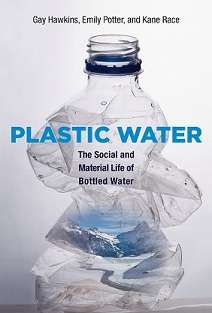Bottled water—the essence of life as commodity

A new book co-authored by Deakin University academic Dr Emily Potter exposes the secret life of bottled water, one of the most controversial products in the world.
Plastic Water: The Social and Material Life of Bottled Water follows this seemingly mundane product from its inception in the 1970s to its development as a billion-dollar global market and subsequent backlash from community and environmental activists.
Dr Emily Potter, Senior Lecturer in the School of Communication and Creative Arts at Deakin University, explained that bottled water is a very different thing in different settings.
"The same PET bottle of water can exist as a product, personal health resource, object of boycotts, part of accumulating waste matter, and much more," Dr Potter said.
"Our interest is in looking at how bottled water companies are demonstrating their credentials and the ways in which this cause-related marketing is shaping new relationships between consumers and the brand."
Bottled water is big business with an estimated US$158 billion in annual sales worldwide, including $500 million in Australia, making it a fascinating subject for discussion.
The result of an extensive international study, Plastic Water examines how and why branded bottles of water have insinuated themselves into our daily lives and the impact that this is having on safe urban water supplies.
"The commodification of water has seen the population in cities such as Chennai facing a scarcity of water as a result of the bottled water industry using its existing bore water to produce bottled water," Dr Potter explained.
"All of these factors play into our main aim of trying to understand how mass markets in packaged water and new practices of drinking have been assembled and the political effects of this.
"Although plastic bottles themselves are not new – having been developed in a Du Pont laboratory in 1973 – filling them with water has prompted a massive range of activism."
Dr Potter explained that the rise of 'exercise science' in the 1970s first saw water bottles become a status symbol.
"This need for 'constant hydration' came as jogging became more fashionable in the early to mid-1970s. In turn, being seen with a bottle of water in your hand signified your commitment to healthy living," Dr Potter said.
"Since then, the rapid expansion of the market has seen the development of prestige brands which seek to place the product as a luxury item.
"For example, Claridge's in London has a 'water menu' and a company called 'Bling Water' produces frosted bottles encrusted in Swarovski crystals that retail for over $50 a bottle."
Coca Cola Amatil (CCA), one of the strongest competitors in the crowded bottled water market, features strongly in the book.
"The way it pitches bottled water to the market is quite remarkable," Dr Potter said.
"For example, some observers have argued that CCA rode on the back of the Federal Government's intervention in the Northern Territory in 2007 in order to position bottled water in Indigenous communities.
"Religious and evangelical groups have also been known to use bottled water as a tool for infiltrating communities.
"Thank You Water is associated with evangelical groups who have been accused of using it as a missionary opportunity in the villages they provide water to."
Dr Potter is cautious when it comes to discussing bottled water producers who link themselves with philanthropic groups.
"As criticism of the bottled water industry has grown, more companies have sought to create a positive association with their product – for example, Mount Franklin's long-established partnership with The McGrath Foundation," Dr Potter said.
More information: Plastic Water: "The Social and Material Life of Bottled Water" by Gay Hawkins, Emily Potter and Kane Race. MIT Press, mitpress.mit.edu/books/plastic-water
Provided by Deakin University




















